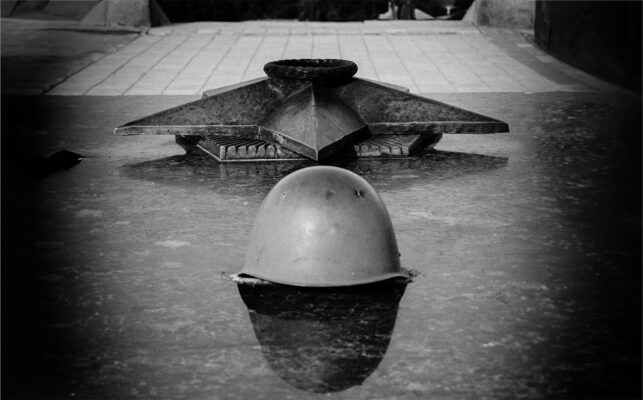Within the confines of an oppressive ruling, the hopeful whisper “If only Stalin knew” once offered a glimmer of reprieve. It was a prayer from those ensnared in the shadow of the iron curtaint—a wishful thinking that maybe, just maybe, the beloved leader was unaware of the suffering inflicted in his name. This sentiment reflects a deep psychological need to believe in the inherent goodness of our leaders, even against a backdrop of undeniable brutality.
This sentiment, etched into the heart of a suffering nation, echoes a profound psychological longing—the desire to cling to the image of a benevolent protector, a leader untarnished by the grim deeds done in his shadow. It’s the story we whisper to ourselves when the night is at its darkest, a tale that allows us to drift into uneasy slumber, believing the unfolding injustices are mere oversights, not the cold calculus of power.

If Only Stalin Knew
The saying “If only Stalin knew” comes from back when Joseph Stalin was running the Soviet Union, “the boss,” so to speak. People who lived under his rule had it really tough—there were a lot of harsh constraints, and many people were punished or disappeared for no good reason (some of my family members included). Despite all this, a lot of folks thought that Stalin himself was a good guy and didn’t know about the bad stuff happening. They believed that if he did know, he would put a stop to it.
It was easier for them to think that the problems were caused by Stalin’s helpers messing up and that Stalin would fix everything if he found out about it. This was part of the image that was created around Stalin to make him look like a hero, a god-like figure who cared about the people, even though the reality was much scarier.
Today, when people say, “If only Stalin knew,” they’re usually pointing out that someone is pretending that a leader is not to blame for what’s going wrong, thinking that they just don’t know the full story. It’s kind of like when something bad happens at a company, and people say, “If the boss knew, things would be different.”
It’s a way of saying that sometimes people don’t want to admit that their leader is part of the problem, maybe because that’s a hard thing to face or they’ve been led to believe the leader is better than they really are.
This phrase is a way to talk about times when people just can’t believe that someone in charge would let bad things happen on purpose, or they’re scared to admit that the person they look up to might not be as great as they thought.
The Benevolence Illusion
The allure of the benevolent leader is as seductive as it is ancient. It is the belief in a guardian figure, unsullied by the misdeeds carried out in their name, a figure who, if only made aware, would surely rectify the wrongs of the world. It’s a story we tell ourselves, a tale that lets us sleep at night, thinking that the injustices are not by design but by mistake. It’s a coping mechanism, one that speaks to our desire to see our leaders as our guardians rather than our oppressors.
To understand this, one must first embrace the complexity of human psychology and societal structures. The narrative of benevolence is intricately woven from threads of our innate desire for a protector, a wise shepherd guiding their flock. It is both a testament to human hope and a canvas showcasing our deepest fears.
True leadership should be a relationship built on trust and mutual respect. But too often, history tells us about those in power who have been elevated to a status that seems beyond the reach of ordinary morality. The story of Stalin is a powerful example of how a leader’s true character and actions can be obscured by the creation of an almost mythical persona.
The Echo of Denial: The Cult of Personality and Its Shadows
The notion that the woes of a nation could be invisible to its leader speaks volumes about the human capacity for denial. It’s comforting to think of leaders as inherently good, merely shielded from the truth by layers of bureaucracy or malevolent advisors. This perspective allows for a simpler world, where good and evil are cleanly separated, and where accountability is merely a matter of informing those who are naively unaware. Yet, history tells us a more complicated story, where leaders are not mere spectators to their times but architects of them.
Stalin’s image was meticulously crafted, a blend of myth and media that presented him as the paternal guardian of the state. The harsher the times, the more fervent the belief in his supposed benevolence. This cult of personality served as a smokescreen, a theatrical mask for the grim face of oppression. The saying “If only Stalin knew” was the populace’s unwitting complicity in the grand illusion, an illusion maintained by fear and an almost desperate need for a fragment of nobility within their leader.
Reflections in the Modern Glass
The phrase remains potent, transcending its Soviet origins to whisper through the halls of modern power structures. In corporate scandals, political cover-ups, contemporary cult-like organizations, high-controlled groups, or even small-scale leadership failures, the sentiment persists: “If the leader only knew.” This echoes the same dangerous innocence, the reluctance to acknowledge that those at the helm may be steering with full knowledge of the rocky waters ahead.
In this space of reflection, where the individual grapples with the contradictions of authority, there exists a powerful silence. It is within this silence that the seeds of questions take root. “What is the nature of truth?” “Where does the responsibility of leaders begin and end?” These inquiries are not accusations but whispers of a consciousness seeking to understand the world beyond the facade.
The notion that “If only Stalin knew” is an example of cognitive dissonance where individuals’ beliefs do not match the reality of their situation, so they create explanations that are more psychologically comfortable than the truth.
The invocation of Stalin’s unknowingness is not merely a historical footnote. Our trust in leadership is a reflection of our need for a narrative that resonates with our values, a story that reassures us of a moral compass guiding the hand of those who lead.
“If only Stalin knew” is not just a statement about the past; it’s a mirror to our own times. It challenges us to see beyond the curated images of those in power, to question the narratives fed to us through the glowing screens of our age. It calls for a vigilant appraisal of actions over words, of the reality over the myth. The power of this phrase lies in its capacity to stir us from the slumber of complacency into the daylight of inquiry.
As we stand in the midst of our own complex times, may we learn from the past and not wait for the benevolent revelation of truth from those above. Let the phrase “If only Stalin knew” not be an indictment of a bygone populace, but a call to action for us, the inheritors of their history. Let it remind us that in the pursuit of truth, we must sometimes forge past the comfortable narratives and confront the disquieting realities head-on.
A Lingering Whisper
The distance between history and the present is not as vast as it seems. The phrase “If only Stalin knew” serves as a timeless reminder that the responsibility of knowledge and the pursuit of truth falls on each of us. In the search for a better world, let our words be more than whispers against the stone; let them be the clarion call for transparency, accountability, and the unwavering courage to see things as they are.
Be Alive 🌱
Love ❤️, Julia
Personal Liberation
The Illusion of the Benevolent Leader: “If Only Stalin Knew”
Within the confines of an oppressive ruling, the hopeful whisper “If only Stalin knew” once [...]
Navigating Spiritual Seeking: The Fine Line Between Salvation and Subjugation
Finding Authenticity Amid Deception You know how we’re all sort of searching for something bigger [...]
Reclaiming Authenticity: From Illusions to Oceanfront Awakening
In the quietude before dawn, when the world is still enveloped in shadows, we find [...]
Misguided: From Spiritual Heist to Authentic Peace
Spirituality, like a mirror, reflects back what we often wish to see in ourselves—innate wisdom, [...]
Feel More Connected and Less Alone 💞
FROM MY HEART TO YOURS
GUIDED MEDITATIONS 💗
DISCLAIMER: The materials and the information contained on the Positive Pranic website are provided for general and educational purposes only and do not constitute any legal, medical, or other professional advice on any subject matter. None of the information on our videos is a substitute for a diagnosis and treatment by your health professional. Always seek the advice of your physician or other qualified health providers prior to starting any new diet or treatment and with any questions you may have regarding a medical condition. If you have or suspect that you have a medical problem, promptly contact your health care provider.






























